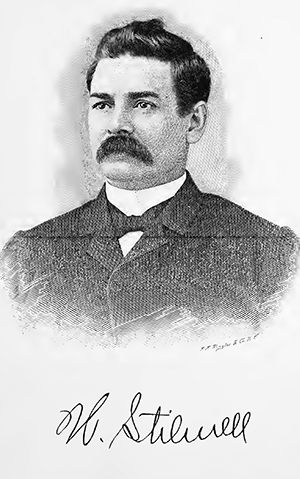Wellington Stilwell

Hon. Wellington Stilwell, attorney at law, Millerburgh, Ohio, is a native of Holmes County, born in 1847. He is a descendant of an English family that was prominent in the days of Charles I and Charles II. The family name was originally Cook, and consisted of three brothers who were leaders of the party opposed to the crowned head of England. One held a prominent position under the British Government during the reign of Charles I, and was executed for being conspicuous in securing the death of the King. The two remaining brothers then removed to Holland, whence all letters sent were signed Stil-well, and finally became Stilwell. The family has been a prominent one both in military and civil life, and since its identification with American history, has had representatives at the bar, on the bench, in State legislature and in Congress. At an early day the name became prominent in the State of Ohio.
The representative of the family who is the subject of our notice is no exception to the general rule, and although in youth his circumstances were not at all encouraging to one fired with an amibition to hold a high position among his fellowmen, yet by determination and perseverance he was finally successful, and to day he stands at the head of his profession, and is one of the most honored men in the county. His early life was one of toil on the homestead farm. Paying his way by teaching during the winter, he obtained an academic educaiton, and then turned his attention to the study of his chosen profession, and in 1868 was admitted to the bar. He served four years as school examiner, to the general satisfaction of teachers and public. Already his fellow-citizens recognized the ability of the young attorney, and the following year he was called upon to represent them in the State legislature. Here, although one of the youngest members of that body, he was conspicuous in the argument and as the first to open the discussion upon the famous Fifteenth Amendment debate. In 1872 he was again returned to the legislature, thus serving a period of four years. For several years he gave his attention to the practice of his profession, and his work was usually attended with success, both at the bar and as a counsellor. In 1882 he was the choice of the Democratic party for, and elected by a large majority to, the position of Judge of the Common Pleas District composed of Holmes, Coshocton, Wayne, Richland, Ashland, Morrow, Knox, Delaware and Licking Counties. In this position he has performed his duties impartially, and is honored by the profession, irrespective of political preferences.At the close of his time he declined renomination, preferring to resume his practice which is a lucrative and in every way a satisfactory one.
The question of tariff, its operation and effect, has probably received as much of his attention, as from any man of his age in Ohio, and he is a pronounced tariff reformer. In 1884, before the name of "trust" was heard, he predicted, in a series of papers, that, fostered by high tariff taxes, combination of capital would take place to raise prices of the necessaries of life, to do which they would decrease production, and consequently decrease the amount of work and the wages of the toilers. He is a great admirer of Ex-President Cleveland for the exhibition of his courage seen in his message which called the public attention officially to the evils of the combination which he had predicted were the natural outgrowth of high tariff, and in 1888, he took a prominent part in the tariff discussion, making thirty-six speeches, and having twice as many calls which he could not fill. He recognizes that the economic question involved in the tariff, with its kindred growth, the trust, is the greatest danger now threatening the toiling people, and that to deal with the subject properly the people are called upon, for their own preservation, to bring to the front, and especially to the halls of Congress, men of the highest ability, together with unflinching courage.
The judge is still a young man, and, in the years that lie ahead of him, is destined, if the people realize their own best interests, to have a still firmer hold on the hearts of the people than he already enjoys, and the ambitions of his youth may be far excelled in the realities of the future.
From Commemorative Biographical Record of the Counties of Wayne and Holmes, Ohio, J. H. Beers & Co., Chicago, 1889
